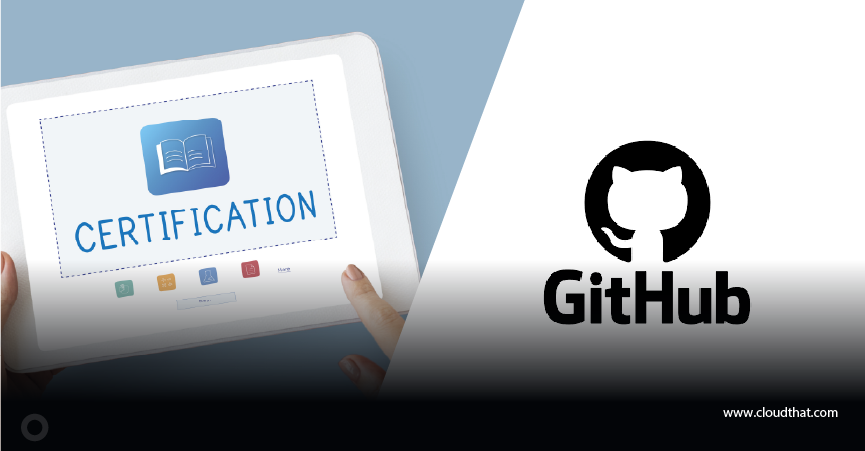|
Voiced by Amazon Polly |
Greetings, IT leaders, architects, and technical specialists! In today’s highly competitive and rapidly evolving technology landscape, proficiency in GitHub isn’t just a requirement; it’s a foundational capability. It’s the engine driving collaborative development, sophisticated CI/CD pipelines, and secure software delivery. While deep operational knowledge is often gained through experience, how do you formally validate your expertise and strategically position yourself for the next level?
The answer lies in GitHub’s official certification program. These credentials are more than just badges; they are rigorous, industry-recognized validations of your specialized skills within the GitHub ecosystem. They serve as a clear signal of your commitment to excellence, your depth of knowledge, and your ability to deliver tangible value in critical domains like automation, security, and enterprise administration. Investing in these learning paths is not merely skill acquisition; it’s a strategic career maneuver.
This guide will dissect each GitHub certification, providing the granular detail and professional context you need to identify the optimal path for your career trajectory and your organization’s evolving needs.
Start Learning In-Demand Tech Skills with Expert-Led Training
- Industry-Authorized Curriculum
- Expert-led Training
Unlocking Professional Growth: A Deep Dive into GitHub certifications
1. GitHub Foundations: Establishing Your Core Technical Competence
While seemingly introductory, the **GitHub Foundations** certification establishes a robust understanding of Git’s underlying mechanics and GitHub’s collaborative paradigm. For IT professionals, this translates to predictable workflows, effective team synchronization, and a standardized approach to version control.
Target Professional Roles
- Software Engineers (All Levels): Solidify Git command mastery (
rebase,cherry-pick), optimize Pull Request strategies (merge types, squashing), and streamline issue resolution. - Technical Leads & Architects: Ensure consistent Git best practices across teams, improving code quality and maintainability.
- Project Managers & Scrum Masters: Gain precise insight into development progress, optimize project board utilization, and facilitate more effective agile ceremonies.
- QA & DevOps Engineers: Leverage GitHub’s features for comprehensive test case management, bug tracking, and understanding the core CI/CD triggers.
Key Technical Domains Validated:
- Advanced Git Concepts: Branching strategies (GitFlow, Trunk-Based Development), commit hygiene,
reflogfor recovery, and understanding detached HEAD states. - GitHub Repository Management: Effective use of
.gitignore,.gitattributes, repository templates, and understanding different visibility levels. - Collaborative Workflow Optimization: Best practices for Pull Request reviews (code owner assignments, required reviews), utilizing GitHub Issues for detailed task tracking, and structured GitHub Projects for portfolio management.
- Foundational GitHub Ecosystem: High-level understanding of how GitHub Actions, Codespaces, and GitHub Advanced Security integrate into a unified developer platform.
Strategic Career Impact: This certification validates a common operational language across development teams, reduces technical debt related to inconsistent Git usage, and improves overall project predictability. It’s the **critical baseline for career progression** in any GitHub-centric environment.
2. GitHub Actions: Orchestrating Automated Development & Delivery Pipelines
For professionals driving automation and continuous delivery, the GitHub Actions certification is indispensable. It validates your ability to design, implement, and secure robust CI/CD pipelines, directly contributing to faster release cycles and improved software quality.
Target Professional Roles
- DevOps Engineers & SREs: Architecting resilient CI/CD pipelines, implementing GitOps workflows, and managing automated deployments across complex environments.
- Software Engineers: Building automated testing frameworks, integrating static analysis tools, and orchestrating deployment steps directly from their repositories.
- Release Engineers: Ensuring deterministic builds, automated testing, and secure release processes with comprehensive audit trails.
- Platform Engineers: Standardizing and centralizing automation logic for reusability across multiple teams.
Key Technical Domains Validated:
- Complex Workflow Design: Advanced YAML syntax, concurrent jobs, matrix strategies for diverse environments, dynamic variable manipulation, and conditional execution.
- Runner Management & Scaling:Optimizing performance with GitHub-hosted runners, configuring and securing self-hosted runners, and implementing runner groups for specific workloads.
- Secure Credential Handling: Best practices for GitHub Secrets, environment protection rules, and leveraging OpenID Connect (OIDC) for seamless, secure cloud integrations.
- Custom Action Development & Maintenance: Building reusable composite, JavaScript, or Docker actions, publishing to the Marketplace, and managing versioning.
- Workflow Optimization & Resiliency: Implementing caching strategies, artifact management, job dependencies, and robust error handling/retry mechanisms.
- Security Best Practices for Actions: Mitigating supply chain risks, understanding OIDC security implications, and securing external dependencies.
Strategic Career Impact: This certification directly correlates with enhanced development velocity, significant reduction in manual errors, and improved system reliability. It’s a **cornerstone for professionals leading digital transformation initiatives** and implementing modern Dev(Sec)Ops practices.
3. GitHub Advanced Security: Leading Code Integrity and Supply Chain Resilience
In an era of escalating cyber threats and software supply chain vulnerabilities, the GitHub Advanced Security (GHAS) certification positions you as a critical asset. It validates your expertise in embedding security controls directly into the developer workflow.
Target Professional Roles:
- Application Security (AppSec) Engineers: Deploying, configuring, and customizing GHAS features, and integrating them into enterprise security frameworks.
- DevSecOps Practitioners: Implementing automated security gates in CI/CD, managing security policies, and fostering a “Shift Left” security culture.
- Security Architects: Designing secure coding standards and ensuring comprehensive vulnerability management across the SDLC.
- Software Engineers (Security-Focused):Identifying and remediating vulnerabilities, performing security-focused code reviews, and understanding common attack vectors.
Key Technical Domains Validated:
- Code Scanning (CodeQL) Expertise: Writing and customizing CodeQL queries, integrating third-party SAST tools, and interpreting complex security alerts.
- Secret Scanning Implementation: Configuring custom patterns, managing alerts, and preventing credential exposure at the repository and organization level.
- Dependency Review & Dependabot Management: Automating vulnerability detection in direct and transitive dependencies, integrating with internal registries, and managing alert triage for large codebases.
- Supply Chain Security Best Practices: Understanding SLSA (Supply-Chain Levels for Software Artifacts) principles, signing commits, and securing build environments.
- Security Policy & Governance: Implementing branch protection rules, custom enterprise rules, and fine-grained access controls for sensitive assets.
- Security Overview Integration: Utilizing GitHub’s centralized security dashboard for holistic risk assessment and reporting.
- Strategic Career Impact: This certification demonstrates a proactive approach to cybersecurity, directly mitigating organizational risk and ensuring compliance with industry standards. It positions you as a critical player in building resilient, trustworthy software systems.
- GitHub Administration: Governing and Scaling Enterprise GitHub Deployments
For IT professionals responsible for the operational integrity, scalability, and compliance of GitHub across an entire organization, the **GitHub Administration** certification is paramount. It validates your ability to manage GitHub as a core enterprise platform.
Target Professional Roles:
- System & Platform Administrators: Deploying, upgrading, monitoring, and maintaining GitHub Enterprise Server instances for high availability and performance.
- GitHub Enterprise Admins:Managing identity and access (SAML/SCIM), configuring enterprise-level settings, and ensuring secure collaboration across hundreds or thousands of users.
- IT Operations & Infrastructure Engineers:Integrating GitHub with existing corporate directory services, network infrastructure, and monitoring systems.
- Compliance & Audit Leads: Implementing and enforcing granular security policies, managing audit logs, and ensuring adherence to regulatory requirements.
Key Technical Domains Validated:
- Enterprise Authentication & Identity Management: Advanced SAML configuration, SCIM provisioning, LDAP synchronization, and managing complex user lifecycles.
- Organization & Repository Governance: Implementing enterprise policies, managing repository creation permissions, and structuring large organizations for discoverability and control.
- Enterprise Security & Auditing: Configuring advanced audit log streaming, responding to security events, and managing enterprise-wide security features.
- GitHub Actions Management at Scale: Configuring and managing self-hosted runner fleets, securing runner environments, and enforcing organizational workflow policies.
- Codespaces Enterprise Management: Setting up centralized Codespaces policies, managing compute resources, and integrating with corporate networks.
- Billing & Cost Management: Understanding enterprise billing models, optimizing resource consumption, and implementing cost-saving strategies across the platform.
- High Availability & Disaster Recovery (for Enterprise Server): Designing and implementing robust HA solutions, backup strategies, and recovery procedures.
Strategic Career Impact: This certification is essential for maintaining a stable, secure, and compliant GitHub environment for large organizations. It positions you as a steward of critical developer infrastructure, ensuring operational excellence and strategic platform alignment.
- GitHub Copilot: Driving AI-Enhanced Developer Productivity
The newest, forward-looking certification, **GitHub Copilot** validates your expertise in leveraging AI-driven tools to dramatically enhance developer productivity and innovation within the coding workflow.
Target Professional Roles:
- Software Engineers (All Levels): Maximizing personal coding efficiency, generating complex code patterns, and accelerating testing and documentation.
- Team Leads & Engineering Managers: Guiding teams on effective Copilot adoption, establishing best practices for AI-assisted development, and evaluating its impact on team velocity.
- AI/ML Engineers: Understanding the practical application of generative AI in software engineering and contributing to AI-driven development strategies.
Key Technical Domains Validated:
- Copilot Feature Mastery: In-depth use of inline suggestions, GitHub Copilot Chat, slash commands, and integration with various IDEs (VS Code, Visual Studio, JetBrains).
- Advanced Prompt Engineering: Crafting highly effective prompts to generate precise code, refactor existing logic, write comprehensive tests, and create robust documentation.
- Understanding AI Ethics & Limitations: Grasping the underlying AI models, data handling principles, potential biases, and responsible AI practices in coding.
- Customizing Copilot: Configuring settings, managing language preferences, and utilizing exclusion features for optimal performance and privacy.
- Integrating Copilot into SDLC: How Copilot enhances pair programming, code reviews, debugging, and contributes to overall developer experience.
Strategic Career Impact: This certification positions you at the **vanguard of AI-enhanced software development**. It demonstrates your ability to leverage cutting-edge tools to significantly boost productivity, accelerate feature delivery, and drive innovation within your organization. Become the leader embracing the future of coding!
Charting Your Strategic Ascent: Your Path to Impact
To make the most impactful decision for your career trajectory, engage in a strategic assessment:
- Analyze Your Current Role & Core Value Contribution:Where do you spend most of your time, and what critical problems are you solving?
- Define Your Next Career Milestone: Are you aspiring to a leadership role in DevOps, security, platform engineering, or AI innovation?
- Assess Organizational Needs & Gaps: What challenges is your organization facing in its GitHub adoption, security posture, or automation maturity? Your certified skills could be the direct solution.
Once you’ve identified your strategic target, meticulous preparation is paramount. Leverage GitHub’s comprehensive resources to ensure your success:
Earning a GitHub certification is more than just a personal achievement; it’s a strategic investment that yields substantial returns for both your career trajectory and your organization’s success. It quantifies your specialized expertise, streamlines collaborative processes, fortifies your security posture, and propels automation efficiencies. You’ll be equipped to not just use GitHub, but to optimize it, secure it, scale it, and truly innovate with it.
So, IT professionals, seize this opportunity. Choose your strategic path, commit to the learning journey, and transform your capabilities. Your journey to becoming a recognized GitHub master—and a more impactful professional—starts now.
Ready to solidify your expertise and elevate your career? Share in the comments below: Which GitHub certification will be your next strategic career move?
Upskill Your Teams with Enterprise-Ready Tech Training Programs
- Team-wide Customizable Programs
- Measurable Business Outcomes
About CloudThat
CloudThat is an award-winning company and the first in India to offer cloud training and consulting services worldwide. As a Microsoft Solutions Partner, AWS Advanced Tier Training Partner, and Google Cloud Platform Partner, CloudThat has empowered over 850,000 professionals through 600+ cloud certifications winning global recognition for its training excellence including 20 MCT Trainers in Microsoft’s Global Top 100 and an impressive 12 awards in the last 8 years. CloudThat specializes in Cloud Migration, Data Platforms, DevOps, IoT, and cutting-edge technologies like Gen AI & AI/ML. It has delivered over 500 consulting projects for 250+ organizations in 30+ countries as it continues to empower professionals and enterprises to thrive in the digital-first world.

WRITTEN BY Shyla J
Shyla is an MCT and works on cloud platforms like AWS and Azure. She is certified as an Azure Administrator and works on DevOps tools like Ansible, and Terraform, to create and deploy highly available infrastructure on AWS and Azure.


 Login
Login


 September 16, 2025
September 16, 2025 PREV
PREV











Comments